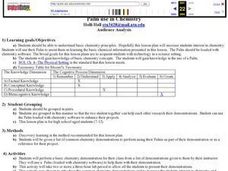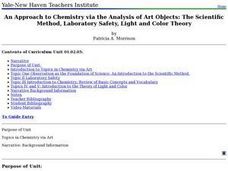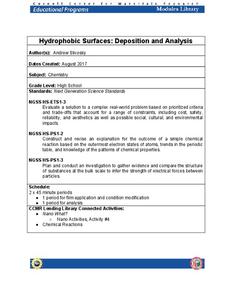Royal Society of Chemistry
Some Reactions of Carbon Dioxide—Microscale Chemistry
Precipitation reactions are always interesting. How about one that forms a precipitate using a gas? Chemists of any age will enjoy this twist on a standard solubility lab. Partners observe the lack of interaction between sodium hydroxide...
Orange Public Schools
Stagecraft
The house lights dim, the curtain parts, lights slowly come up, revealing the stage. Before the actors appear, before a word is spoken, the audience is drawn in by the lighting, by the colors, by lines of the set, by the props, and...
Curated OER
Icecream in a Baggie
Students apply their comprehension of colligative properties to real-world situations. They review the concepts of physical and chemical changes. Students are reminded that science is used extensively in food-production. They are...
Curated OER
The Coriolis Effect
Young scholars will determine the direction of Earth's rotation as viewed from the north and south if they were suspended out in space. They will model how the rotation of the Earth causes currents to be deflected in different directions...
Curated OER
Mini-labs on Newton's Laws
Students are divided into 6 groups with each group rotating to a different lab. The labs can be run over the course of a few days; or spread out for a longer period of time.
Curated OER
Science Investigation Using Water Quality
Eighth graders conduct an experiment that analyzes the physical and chemical characteristics of various water samples. They discuss the procedures and safety concerns for the water test, and test their water samples to determine if they...
Curated OER
Determination of Tensile Stress-Strain Common Properties in Materials
Young scholars demonstrate the relationship between stress and strain, then graph stress-strain curves for various common materials. Students interpret graphed results and discuss differences in mechanical properties of materials.
Curated OER
Palm use in Chemistry
Students use a Palm loaded with chemistry software to assist them in gaining information presented in a lesson about basic chemistry principles. They perform a basic chemistry demonstration for their class using information from received...
Curated OER
Eye Safety
Tenth graders become aware of the need for eye safety in the classroom through three mini labs.
Curated OER
Electric Shock
In this electrical worksheet, students answer a series of 17 questions about electrical shock and electrical safety. This worksheet is printable and the answers are available on-line.
Curated OER
Chemistry: merit badge
In this chemistry instructional activity, students use their workbook to answer short answer questions about chemistry and lab safety. Students complete 7 questions total to get their merit badge.
Curated OER
Lab Safety
In this safety worksheet, students describe the safety concerns identified by the symbols given. Students list precautions to take for these concerns. This worksheet has 6 symbols to describe.
Curated OER
Electroplating for Corrosion Protection: Redox in Action
Learners define what a redox reaction is. In this chemistry lesson, students electroplate some wires in the lab. They research the application of electroplating in the real world.
University of Georgia
Monohybrid Crosses and The Punnett Square Lesson Plan
Looking for a quick, hands-on activity to teach young scientists about Punnett squares through monohybrid crosses? then check out this one.
Teach Engineering
Sugar Spill!
Sugar isn't good for you, but it's great for yeast! Scholars design an experiment to investigate how variables affect the rate of sugar consumption in yeast. The last installment of a nine-part Life Science unit considers how scientists...
Curated OER
An Approach to Chemistry via the Analysis of Art Objects: The Scientific Method, Laboratory Safety, Light and Color Theory
Students create a painting that clearly exemplifies the use of primary pigments to make secondary pigments. They demonstrate the distinction between value and saturation. They explain the affect of adjacent colors on each other and...
Curated OER
Earthquakes and Seismic Waves
Students explore earthquakes and seismic waves. They investigate how energy is released in the subsurface to create seismic waves. Students explore the inner workings of a seismograph and how they are used to determine the location of an...
Cornell University
Hydrophobic Surfaces—Deposition and Analysis
Couches, carpets, and even computer keyboards now advertise they are spill-resistant, but what does that mean? Scholars use physical and chemical methods to coat surfaces with thin films to test their hydrophobic properties. Then they...
American Chemical Society
Neutralizing Acids and Bases
Most things naturally strive for balance, and acids and bases are no exception. Neutralization of acids and bases allows scholars to explore the color changes associated with the pH scale. After this exploration, pupils neutralize two...
Curated OER
Making Soap
Students recognize and use chemical indicators in the lab, recognize the need for safety while doing chemical experiments and understand the need for following precise directions.
Curated OER
Exothermic Rehydration of Gypsum
Students observe exothermic reactions in the lab using plaster. In this chemistry lesson, students collect data from their experimental set up every five minutes. They explain the different stages in the hardening of plaster.
Curated OER
For Your Eyes Only
Students complete several activities in a unit related to the eye. In this eye lesson, students work in groups to research information about the human eye and create a multimedia presentation. They research anatomy of the eye, how the...
Curated OER
Challenges of Sampling
In this sampling worksheet, students try different sampling methods to determine which is the best for determining contamination on a substance. This worksheet has 5 short answer questions.
Teach Engineering
Investigating Contact Angle
Discover the properties of water-loving and water-hating surfaces. In the seventh installment of a nine-part series, scholars explore hydrophilic and hydrophobic surfaces by conducting an experiment. They observe surface coatings,...

























